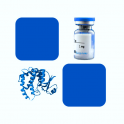
- Remove this product from my favorite's list.
- Add this product to my list of favorites.
Products
Viewed products
Newsletter
 |  |  |  |  |  |

Background
Stem Cell Factor is also known as SCF, kit-ligand, KL, steel factor, KITLG, FPH2, KL-1, Kitl, MGF, SCF, SF, or SHEP7, and is a cytokine that binds to the c-Kit receptor (CD117). SCF can exist both as a transmembrane protein and a soluble protein. This cytokine plays an important role in hematopoiesis (formation of blood cells), spermatogenesis, and melanogenesis. The soluble and transmembrane forms of the protein are formed by alternative splicing of the same RNA transcript.Soluble and transmembrane SCF is produced by fibroblasts and endothelial cells. Soluble SCF has a molecular weight of 18,5 KDa and forms a dimer. SCF plays an important role in the hematopoiesis during embryonic development. Sites where hematopoiesis takes place, such as the fetal liver and bone marrow, all express SCF. During development, the presence of the SCF also plays an important role in the localization of melanocytes, cells that produce melanin and control pigmentation. SCF plays a role in the regulation of HSCs in the stem cell niche in the bone marrow. SCF may be used along with other cytokines to culture HSCs and hematopoietic progenitors. The expansion of these cells ex-vivo (outside the body) would allow advances in bone-marrow transplantation, in which HSCs are transferred to a patient to re-establish blood formation.
Source
Recombinant Biotinylated Human SCF, Avitag,His Tag (SCF-H82E1) is expressed from human 293 cells (HEK293). It contains AA Glu 26 - Ala 190 (Accession # AAH69797).
Predicted N-terminus: Glu 26
Molecular Characterization
This protein carries an Avi tag (Avitag™) at the C-terminus, followed by a polyhistidine tag.
The protein has a calculated MW of 21.7 kDa. The protein migrates as 26-38 kDa on a SDS-PAGE gel under reducing (R) condition due to different glycosylation.
Biotinylation
Biotinylation of this product is performed using Avitag™ technology. Briefly, the single lysine residue in the Avitag is enzymatically labeled with biotin.
Biotin:Protein Ratio
Passed as determined by the HABA assay / binding ELISA.
Endotoxin
Less than 1.0 EU per μg by the LAL method.
Purity
>95% as determined by SDS-PAGE.
Formulation
Lyophilized from 0.22 μm filtered solution in PBS, pH7.4. Normally trehalose is added as protectant before lyophilization.
Reconstitution
Please see Certificate of Analysis for specific instructions.
For best performance, we strongly recommend you to follow the reconstitution protocol provided in the CoA.
Storage
For long term storage, the product should be stored at lyophilized state at -20°C or lower.
Please avoid repeated freeze-thaw cycles.
This product is stable after storage at:
-20°C to -70°C for 12 months in lyophilized state;
-70°C for 3 months under sterile conditions after reconstitution.
Bioactivity
Please refer to product data sheet.
(1) "Theoretical Understanding of the Nonlinear Raman Shift of C≡N Stretching Vibration of p-Aminobenzonitrile in Supercritical Water"
Suda, Yokogawa
J Phys Chem B (2023)
(2) "An innate pathogen sensing strategy involving ubiquitination of bacterial surface proteins"
Apte, Bhutda, Ghosh et al
Sci Adv (2023) 9 (12), eade1851
(3) "Cryo-EM analyses of KIT and oncogenic mutants reveal structural oncogenic plasticity and a target for therapeutic intervention"
Krimmer, Bertoletti, Suzuki et al
Proc Natl Acad Sci U S A (2023) 120 (13), e2300054120
Showing 1-3 of 9855 papers.
Follow us